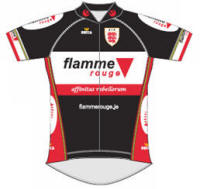Slacktober ~ Recovery & Analysis

Well that's it. The season, for most of the northern hemisphere is over. National, Regional, State and Island Championships are done and dusted and you'll now know if if all that winter effort was worth it.
What next? Head to the beach, that's what!
As ever it's been a long season and you're probably happy (in a sad way) that it's drawing to a close. But it shouldn't be over just yet. There are a few technical, administrative and physiological loose ends you should tidy up before you hang up your best wheels for the winter.
Ideally, you should get some sort of measure of your current fitness through a Ramp Test with us, your nearest qualified coach if handing over money, or you can get a half decent result by doing a 6 minute effort yourself. Take a look at the factsheets for the low down on what this entails.
Once that's out the way, three things need your direct and immediate attention; reflection, recovery and rest. We'll deal with the easiest one first; reflection.
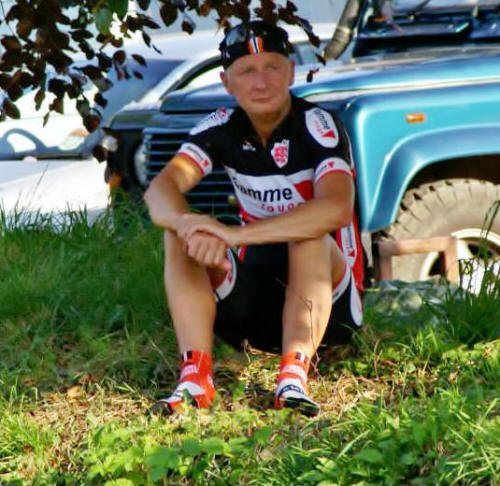
me ~ doing some reflecting
2015 Island Games
Reflection
Take time today, or this weekend
at the latest, to sit back and reflect on the season you've just had.
Get a pen and pad, I know you won't but just try it anyway, and take five minutes maximum, to write down the answers to the following questions:
▼ did I race to my pre-season expectations?
▼ did I meet my season's key objectives?
▼ did I enjoy my season from beginning to end?
▼ did I race with my training peers on an equal footing?
▼ did I balance my training & racing with real life needs?
▼ do I feel as strong now as I did in May?
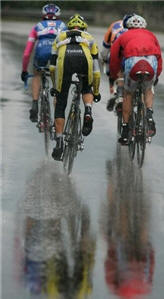
Only you can truthfully answer these questions and only you can address the issues that arise from them.
If you don't write the answers down now, and reflect on them, you may well not remember later how your season went and miss a learning opportunity.
If you leave your reflection too long, the clarity of your answers will drift away with the passage of time and so will your ability to benefit.
The quality of your sustained and continued progression as a competitive cyclist relies heavily on the accuracy of your answers to the above questions.
So please, fight your natural, but healthy cynicism, and give it a go. What's the worst that could happen? Trust me, it works!
Success & Failure
The saying goes, that you learn more from your failures than your successes. But that isn't
necessarily true. It's just that most people are conditioned to spend time dwelling on their
failures rather than spending time enjoying their successes.
Remember at school when you got nine out of ten? The teacher spent ten-times as long telling you where you went wrong on "the one", rather than applauding the fact that you got nine right!
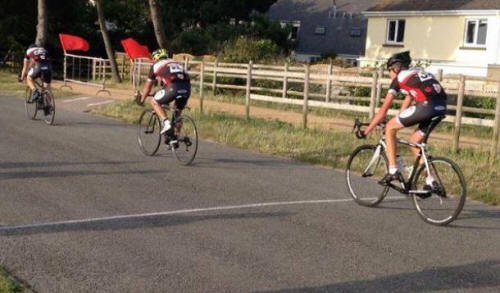
Dave Le Roux, Mani Pita,
Callum Ecobichon
EFR 1, 2, 3, Quennavais Track Jersey
Celebrate your success and analyse why things went so well. If you don't know when, how and why you succeeded how can you hope to replicate success in the future? Record it now before you forget or it gets blurred with time.
Also, if you don't make a note in your training diary (you do have one?) about what didn't go so well, you could fall in to the trap of repeating the same drills as this year, only making them harder to try to force a breakthrough.
Doing the same thing harder, to chase the success that previously proved elusive, is not always (is never) the answer.
Without a true, measured, reflection you could actually make your results worse! Don't expect different outputs from more of the same inputs.
Different outputs require different inputs. Reflect on both, don't just look at the results; whether they be good or not so good!
Without reflection, you may well forget what a great season you've just had and fail to enjoy your successes before you start training for next season.
If you did well reward yourself. Or what's the point of thrashing yourself on the roads and climbs for ten months of the year?
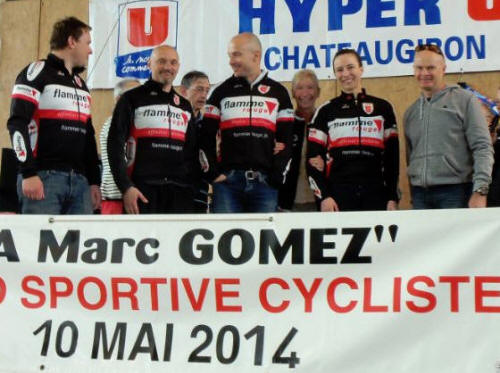
Recovery & Rest
Whatever your answer to the above questions, our recommendation for you now is exactly the same. You must rest and recover; and recover fully, before entering into a
training programme for next season.
To perform at your best next year, your mind and body needs full recovery from this. And as you get older you need a quality recovery period, not just a short rest.
Full recovery from this season is the key to a successful race programme for the next season and you can only achieve that by scheduling in a measured quantity of quality resting time.
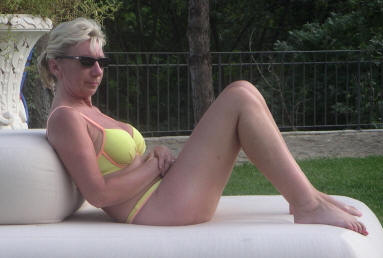
Mrs flamme rouge
getting some quality rest at Lake Como
after we completed the Giro Lombardia sportive
Your body has to rest sometime. The clever bit about a structured training programme is that you get to make sure you choose the time and duration of the rest period and not let your body or, worse still, some infection choose it for you.
Because when your body chooses, it does so in an instantaneous and unglamorous way, at the most inappropriate moment. Very quickly you can become run-down, lethargic and "off-the bike" ill; severely compromising your ability to perform training of any kind.
To perform at your full potential sometime in the near future, you need to slowly back out of this season before you slowly move in to the next. And that's what we call Slacktober.
In the old days (the 70's & 80's) it used to last until January but now it's just a month or so.
Use your freed up training time to visit the doctor (or other health professionals) for a quick once over, especially if you're one of our "mature" readers (vets). Get any season long aches and pains attended to before you compound the problems next season.
Get yourself to the dentist as well. A quick check and tinker will nip any potential issues in the bud. The last thing you want is a tooth problem as you enter your full on training period.
It's also worthwhile having a quick review of your bike setup. I'd been riding the same position for twenty four years because it worked and I was comfortable; or I thought I was.
I road tested a bike that had a high front end and I was a centimeter higher than I liked. For the first hour I was distracted. For the second I was surprisingly comfortable. In the third it was job done.
I've now raised my bars a centimeter higher and the difference on my back was remarkable. Get a second opinion because sometimes stubbornness, like age, just creeps up on us.
Throttle Back
Cut all
interval, top-end and high speed riding. You can retain about 75% of
your peak season aerobic fitness by maintaining week-end,
Zone II endurance rides and
some mid-week intensity.
The other 25% can be brought back in January and February which will then allow you to develop your anaerobic capacities back to and above your previous seasons levels.
But for now rest, quality intensive rest is the key to future success.
Paradoxically the problem is that at the moment most of us are screaming fit. We may be mentally jaded but we still think that if we hang on to the fitness we now have, we can build on it for next year.
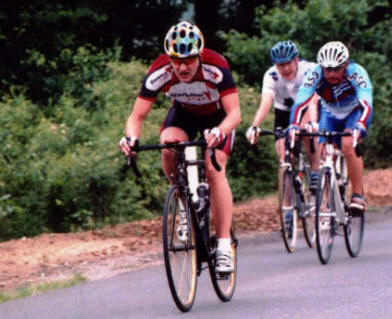
If it were only that simple. If it was, people who have just started cycling would never be able to compete against those that have been racing for many years. But we often find people turn up out of the blue, do a winter, and mix it with the best come April and May. How does that work?
Expanding the principle further; if we trained and progressed every single day without a break, surely we'd be good enough to go to the Olympics after four years?
In case you were wondering, the answer's no! The only place you'll be going with that principle is the hospital. So quality recovery and rest is the order of the day.
Nutrition
Nutrition management during your recovery period is also
important. That phrase is a fancy way of saying you've cut your
activity make sure you cut your food intake.
Don't go on a diet or anything daft, just make sure you eat the right things in the right quantities and make sure you treat yourself to something nice at the weekends.
No one eats like a cyclist, except perhaps a locust. It's so easy to forget to throttle back on the quantity of food as you throttle back on the mileage. Pay attention to your clothing. Don't let your winter kit take on the look of compression clothing!
In my opinion, you need to gain at least a kilo, possibly two, during the winter months but not much more. You need to keep a little body fat on to help you through the winter. It's nature's way.

Staying at peak fitness, and your leanest race weight, is for the summer only and is very stressful on your body. Don't go berserk and start piling on the bulk, just gain a kilo to give yourself a fighting chance when the winter infections start doing the rounds.
Eat sensibly but treat yourself to the things you've left out during the year. For me it's rhubarb crumble and custard! I'm sure yours is more exotic and less "northern".
For the winter give your body a rest from maintaining racing weight. You're not racing so why add stresses you don't need? For now we should be actively resting, intelligently eating and slowly riding.
Your job now, is to prepare yourself for a faster, more powerful and successful new season. If you want something to do, start looking at some new sessions for next year's plan, or get yourself a ready made plan personalised just for you.
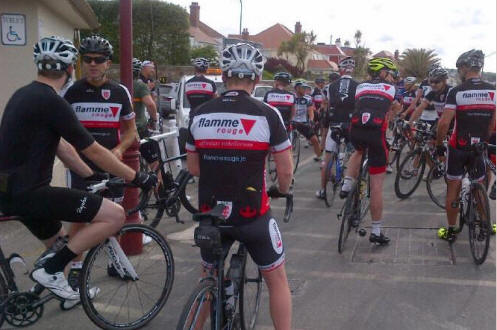
Gunsite Grupetto ~ just slowly ride with your mates and have a laugh
The Message
That's it, short and sweet. Look back, think about what you've
achieved and start to plan and think about next year. However next
season is five months away. So relax, ride slower, ride shorter and
treat yourself, but not too much, with a nice after dinner pudding at
weekends.

Cruise through the next few weeks and start to feel fresh again. Get out the winter bike and start thinking about fitting mudguards.
Go for a swim or a run but whatever you do do it non-competitively, do it slowly and get plenty of rest. The time will soon come for some heavy work and you and your body need to be ready. Get your body, your life and your health back in balance.
See you in November when it all kicks off again.

